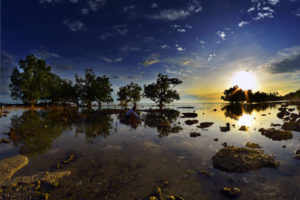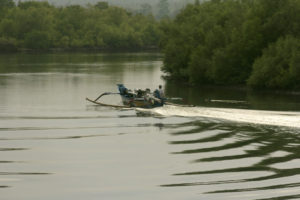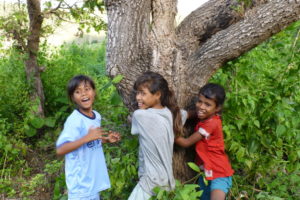
The global framework to reduce emissions from deforestation and forest degradation known as REDD+ is ambitious and groundbreaking.
After years of national, sub-national and project-level experimentation, focused, innovative research is required to understand REDD+ successes and failures amid diverse local conditions.
Looking at REDD+ across the globe, a continuing Center for International Forestry Research (CIFOR) project – now in its third phase – is striving to ensure those impacted by and working to prevent deforestation have the best information and tools available to them. The Global Comparative Study on REDD+ (GCS REDD+) project is supported by the Norwegian Agency for Development Cooperation (Norad). It counts on further funding from the International Climate Initiative (IKI) of the German Federal Ministry for the Environment, Nature Conservation, Building and Nuclear Safety (BMUB), USAID and the CGIAR Research Program on Forests, Trees and Agroforestry (CRP-FTA), with financial support from the donors contributing to the CGIAR Fund.
Scientists and researchers at CIFOR and its many partner institutions have been working since 2009 to understand how enabling governance and on-the-ground conditions affect the efficiency and effectiveness of REDD+ policies, how REDD+ policies should be best designed and to find ways to monitor deforestation and forest degradation across different landscapes. This includes the equitable performance of REDD+ with regard to the so-called “non-carbon” benefits — which include equity and poverty reduction, protection of ecosystem services and local livelihoods, rights and tenure.

The CIFOR partnership with Norad has been a successful one, generating over 350 publications on REDD+ and sizeable impact. Key achievements of the project, as determined in ODI’s assessment, include the incorporation of CIFOR’s recommendations on REDD+ policy at the national and international levels. For example, the recommendation of a stepwise approach to setting forest reference levels and reference emission levels, when building their capacity to monitor REDD+ effects (the so-called MRV), has been taken up in the Warsaw Framework and has informed national policies in Guyana and Ethiopia.
UN-REDD made tenure part of its strategy framework based on information that CIFOR generated. CIFOR research contributed to the Cameroon Readiness Preparation Proposal and Peru’s national REDD+ Strategy. In Indonesia, CIFOR supported the Research and Development Agency, Ministry of Environment and Forestry (FORDA) and national REDD+ strategy development.
Also read: Exploring the agency of Africa in climate change negotiations: the case of REDD+
The REDD+ framework has now been finalized in the UNFCCC Conference of the Parties in Warsaw 2013, and REDD+ has been endorsed by the Paris climate agreement. Thus, the road is paved for REDD+ implementation.
CIFOR scientist and project coordinator Christopher Martius said, “In their efforts to move ahead, REDD+ policymakers and practitioner communities can greatly benefit from information, analysis and tools based on scientific evidence, such as what we produce at CIFOR. By engaging with our partners, we are working hard to make this evidence as useful as possible for them.”
GCS REDD+ phase three will extend from 2016 to 2020 with funding from Norad, continuing crucial work to understand the complexity of local situations to inform policy that supports REDD+ and its goals.

The project is now focusing more closely – but not exclusively – on eight countries deemed key by Norad’s Norway International Climate and Forest Initiative (NICFI) program – Brazil, Democratic Republic of Congo, Ethiopia, Guyana, Indonesia, Myanmar, Peru and Vietnam. It will also continue to provide policy advice in the global arena, expanding the its reach to include stronger work on private sector initiatives and their zero-deforestation pledges.
“We will assess REDD+ policies and activities in the seven NICFI countries where we have worked before, and expand the study to include a new country, Myanmar, which is very receptive to REDD+ and where deforestation rates are particularly high. In-depth studies of REDD+ demonstration projects will be undertaken in Brazil, Indonesia and Peru,” Martius said.
In emerging economies, the combination of development and sustainability concerns can complicate the implementation of REDD+. The CIFOR project recognizes that balance must be struck, having looked at livelihood outcomes in detail at 23 sites in six countries.
Martius said, “In villages in or near forests the development objectives are much more important than saving carbon or saving trees. If you go to a village in Kalimantan where one of the only income sources is cutting trees, then it quickly becomes very clear that you cannot ignore these concerns.”
Thanks to this collaboration with Norad, we will be able to continue supporting effective emissions reduction and actually step up support to countries in the post-Paris context of climate change mitigation in the land sector of developing countries.”
The work is a component of the CGIAR Research Program on Forests, Trees and Agroforestry (FTA), which integrates the comparative REDD+ study in the broader context of using forests for the development needed to provide a decent living to forest-dependent people.
Now, with the start of phase three, GCS-REDD+ looks to deepen its impact even further to support both people and forests across the globe.
For more information about this initiative, please contact Christopher Martius, Coordinator of the climate change theme of the CGIAR Research Program on Forests, Trees and Agroforestry (c.martius@cgiar.org)











